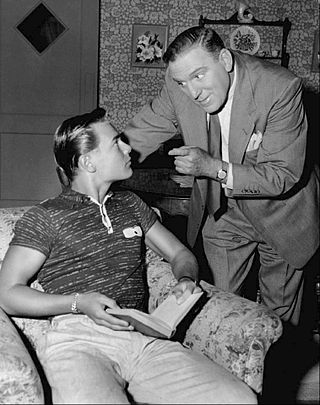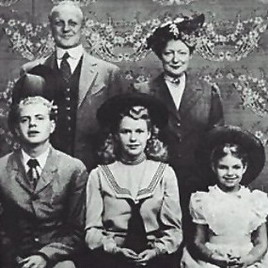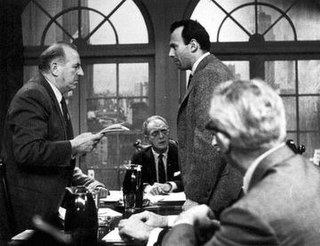Related Research Articles
The year 1969 in television involved some significant events. Below is a list of television-related events in 1969.
Texaco Star Theater was an American comedy-variety show, broadcast on radio from 1938 to 1949 and telecast from 1948 to 1956. It was one of the first successful examples of American television broadcasting, remembered as the show that gave Milton Berle the nickname "Mr. Television".
USA Tuesday Night Fights is a television boxing show. It aired from October 1, 1982, through August 25, 1998 on the USA Network; at one time it was the longest continually-running boxing show on television. The show debuted on October 1, 1982, as Friday Night Boxing (1982-1984), and then, Wednesday Night Fights (1984-1986), and later, Thursday Night Fights (1986-1990).
The Gillette Cavalcade of Sports is an American radio-turned-television program by the National Broadcasting Company (NBC) that ran from 1942 to 1960. The program included broadcasts of a variety of sports, although it is primarily remembered for its focus on boxing matches.

Major League Baseball (MLB) has been broadcast on American television since the 1950s, with initial broadcasts on the experimental station W2XBS, the predecessor of the modern WNBC in New York. The World Series was televised on a networked basis since 1947, with regular season games broadcast nationally since 1953. Over the forthcoming years, MLB games became major attractions for American television networks, and each of the Big Three networks would air packages of baseball games at various times until the year 2000. Fox would rise to major network status, partially on its acquisition of MLB rights in 1996; Fox has been MLB's primary broadcast television partner ever since.

The Life of Riley is an American radio situation comedy series of the 1940s that was adapted into a 1949 feature film, as well as two different television series, and a comic book.
The NBC Monday Movie was a television anthology series of films that debuted on February 4, 1963. It was referred to as Monday Night at the Movies prior to the mid-1980s. Contrary to popular contemporary belief, the corporate initials, "NBC", were, at first, not part of the official title for the network's anthologies of old movies, and would not be for years to come. Thus, in 1964, when the show was transferred by the network's programming executives to Wednesday nights, it became Wednesday Night at the Movies. And in 1965, when the program moved to Tuesdays, it became Tuesday Night at the Movies. It would remain there until 1969. The name would henceforth change depending on whichever night of the week the program aired. Moreover, by 1968, there was once again a weekly Monday Night at the Movies on the air. It ran until 1997.

Mama was a weekly CBS Television comedy-drama series that ran from July 1, 1949 until March 17, 1957. The series was based on Mama's Bank Account by Kathryn Forbes, which was also adapted for the John Van Druten play (1944) and the subsequent film I Remember Mama (1948), and told the ongoing story of a loving Norwegian family living in San Francisco in the 1910s through the eyes of the elder daughter, Katrin Hansen. Katrin would be seen looking through the pages of the family album at the start of each episode with the opening narration:
This old album makes me remember so many things in the past. San Francisco and the house on Steiner Street where I was born. It brings back memories of my cousins, aunts and uncles; all the boys and girls I grew up with. And I remember my family as we were then. My big brother Nels, my little sister Dagmar, and of course, Papa. But most of all, when I look back to those days so long ago, most of all, I remember ... Mama.

Kraft Television Theatre is an American anthology drama television series running from 1947 to 1958. It began May 7, 1947 on NBC, airing at 7:30pm on Wednesday evenings until December of that year. It first promoted MacLaren's Imperial Cheese, which was advertised nowhere else. In January 1948, it moved to 9pm on Wednesdays, continuing in that timeslot until 1958. Initially produced by the J. Walter Thompson advertising agency, the live hour-long series offered television plays with new stories and new characters each week, in addition to adaptations of such classics as A Christmas Carol and Alice in Wonderland. The program was broadcast live from Studio 8-H at 30 Rockefeller Plaza, currently the home of Saturday Night Live.
The following is the 1950–51 network television schedule for the four major English language commercial broadcast networks in the United States. The schedule covers primetime hours from September 1950 through March 1951. The schedule is followed by a list per network of returning series, new series, and series cancelled after the 1949–50 season. This season became the first in which primetime was entirely covered by the networks. It was also the inaugural season of the Nielsen rating system. Late in the season, the coast-to-coast link was in service.
Ford Theatre, spelled Ford Theater for the original radio version and known, in full, as The Ford Television Theatre for the TV version, is a radio and television anthology series broadcast in the United States in the 1940s and 1950s. At various times the television series appeared on all three major television networks, while the radio version was broadcast on two separate networks and on two separate coasts. Ford Theatre was named for its sponsor, the Ford Motor Company, which had an earlier success with its concert music series, The Ford Sunday Evening Hour (1934–42).
The Best of Broadway is a 60-minute live television anthology series that aired on CBS Television on Wednesdays at 10 p.m. Eastern Standard Time from September 15, 1954, to May 4, 1955, for a total of nine episodes. Each show was broadcast live in color from New York City, was an adaptation of a famous Broadway play, and included commercials for Westinghouse featuring Betty Furness. Using a "giant new studio," plays were presented in front of a studio audience, which contributed a Broadway-like element.
Nielsen Media Research (NMR) is an American firm that measures media audiences, including television, radio, theatre, films, and newspapers. Headquartered in New York City, it is best known for the Nielsen ratings, an audience measurement system of television viewership that for years has been the deciding factor in canceling or renewing television shows by television networks. As of May 2012, it is part of Nielsen Holdings.
CBS has occasionally broadcast boxing events; its first broadcast occurred in 1948. The network's most recent broadcasts of the sport have fallen under Al Haymon's Premier Boxing Champions banner, and its most recent primetime broadcasts have been produced by sister pay television channel Showtime.
William Lorne Nimmo was a television and radio personality whose career spanned seven decades.
Four Star Revue was an American variety/comedy program that aired on NBC from October 4, 1950, to December 26, 1953.
Gillette Cavalcade of Sports aired at 10 p.m. ET on Fridays from 1942-1960, most frequently from Madison Square Garden. The networks were Mutual (1942–45), ABC (1945–53), and NBC (1953–60). Don Dunphy did blow-by-blow, with Bill Corum (1942–53) and Win Elliott (1953-60)
Boxing on ABC refers to a series of boxing events that have been televised on the American Broadcasting Company. Many of these events aired under the Wide World of Sports banner which began on April 11, 1964 when challenger Muhammad Ali, then known as Cassius Clay, defeated champion Sonny Liston in the seventh round. ABC's final boxing card occurred on June 17, 2000.
References
- ↑ "Pabst Blue Ribbon Bouts / Fight Of The Week". classicthemes.com. Retrieved June 13, 2023.
- ↑ TV Ratings classictvhits.com [ dead link ]
- ↑ Brooks, Tim; Marsh, Earle F. (June 24, 2009). The Complete Directory to Prime Time Network and Cable TV Shows, 1946-Present. Random House Publishing Group. ISBN 9780307483201.